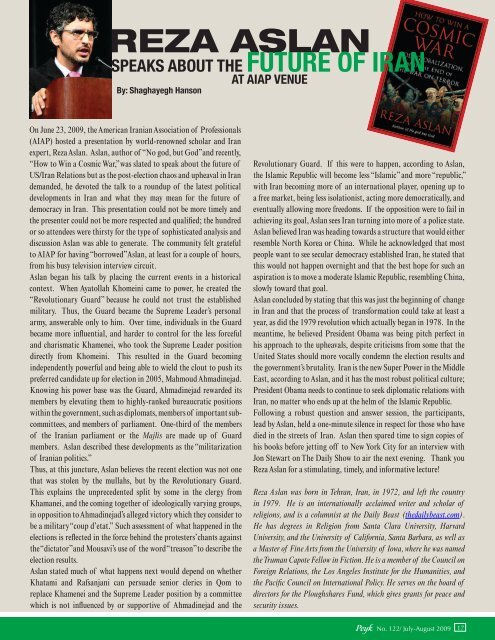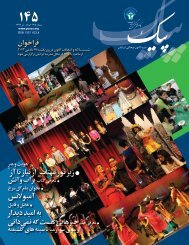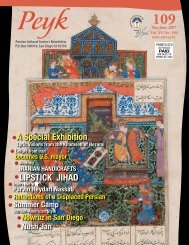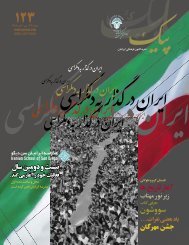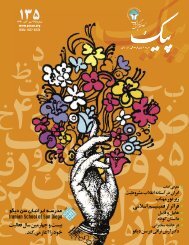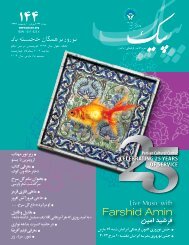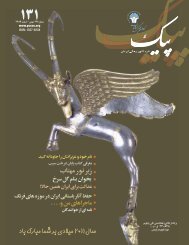You also want an ePaper? Increase the reach of your titles
YUMPU automatically turns print PDFs into web optimized ePapers that Google loves.
REZA ASLAN<br />
SPEAKS ABOUT THE FUTURE OF IRAN<br />
By: Shaghayegh Hanson<br />
AT AIAP VENUE<br />
On June 23, 2009, the American Iranian Association of Professionals<br />
(AIAP) hosted a presentation by world-renowned scholar and Iran<br />
expert, Reza Aslan. Aslan, author of “No god, but God” and recently,<br />
“How to Win a Cosmic War,” was slated to speak about the future of<br />
US/Iran Relations but as the post-election chaos and upheaval in Iran<br />
demanded, he devoted the talk to a roundup of the latest political<br />
developments in Iran and what they may mean for the future of<br />
democracy in Iran. This presentation could not be more timely and<br />
the presenter could not be more respected and qualified; the hundred<br />
or so attendees were thirsty for the type of sophisticated analysis and<br />
discussion Aslan was able to generate. The community felt grateful<br />
to AIAP for having “borrowed” Aslan, at least for a couple of hours,<br />
from his busy television interview circuit.<br />
Aslan began his talk by placing the current events in a historical<br />
context. When Ayatollah Khomeini came to power, he created the<br />
“Revolutionary Guard” because he could not trust the established<br />
military. Thus, the Guard became the Supreme Leader’s personal<br />
army, answerable only to him. Over time, individuals in the Guard<br />
became more influential, and harder to control for the less forceful<br />
and charismatic Khamenei, who took the Supreme Leader position<br />
directly from Khomeini. This resulted in the Guard becoming<br />
independently powerful and being able to wield the clout to push its<br />
preferred candidate up for election in 2005, Mahmoud Ahmadinejad.<br />
Knowing his power base was the Guard, Ahmadinejad rewarded its<br />
members by elevating them to highly-ranked bureaucratic positions<br />
within the government, such as diplomats, members of important subcommittees,<br />
and members of parliament. One-third of the members<br />
of the Iranian parliament or the Majlis are made up of Guard<br />
members. Aslan described these developments as the “militarization<br />
of Iranian politics.”<br />
Thus, at this juncture, Aslan believes the recent election was not one<br />
that was stolen by the mullahs, but by the Revolutionary Guard.<br />
This explains the unprecedented split by some in the clergy from<br />
Khamanei, and the coming together of ideologically varying groups,<br />
in opposition to Ahmadinejad’s alleged victory which they consider to<br />
be a military “coup d’etat.” Such assessment of what happened in the<br />
elections is reflected in the force behind the protesters’ chants against<br />
the “dictator” and Mousavi’s use of the word “treason” to describe the<br />
election results.<br />
Aslan stated much of what happens next would depend on whether<br />
Khatami and Rafsanjani can persuade senior clerics in Qom to<br />
replace Khamenei and the Supreme Leader position by a committee<br />
which is not influenced by or supportive of Ahmadinejad and the<br />
Revolutionary Guard. If this were to happen, according to Aslan,<br />
the Islamic Republic will become less “Islamic” and more “republic,”<br />
with Iran becoming more of an international player, opening up to<br />
a free market, being less isolationist, acting more democratically, and<br />
eventually allowing more freedoms. If the opposition were to fail in<br />
achieving its goal, Aslan sees Iran turning into more of a police state.<br />
Aslan believed Iran was heading towards a structure that would either<br />
resemble North Korea or China. While he acknowledged that most<br />
people want to see secular democracy established Iran, he stated that<br />
this would not happen overnight and that the best hope for such an<br />
aspiration is to move a moderate Islamic Republic, resembling China,<br />
slowly toward that goal.<br />
Aslan concluded by stating that this was just the beginning of change<br />
in Iran and that the process of transformation could take at least a<br />
year, as did the 1979 revolution which actually began in 1978. In the<br />
meantime, he believed President Obama was being pitch perfect in<br />
his approach to the upheavals, despite criticisms from some that the<br />
United States should more vocally condemn the election results and<br />
the government’s brutality. Iran is the new Super Power in the Middle<br />
East, according to Aslan, and it has the most robust political culture;<br />
President Obama needs to continue to seek diplomatic relations with<br />
Iran, no matter who ends up at the helm of the Islamic Republic.<br />
Following a robust question and answer session, the participants,<br />
lead by Aslan, held a one-minute silence in respect for those who have<br />
died in the streets of Iran. Aslan then spared time to sign copies of<br />
his books before jetting off to New York City for an interview with<br />
Jon Stewart on The Daily Show to air the next evening. Thank you<br />
Reza Aslan for a stimulating, timely, and informative lecture!<br />
Reza Aslan was born in Tehran, Iran, in 1972, and left the country<br />
in 1979. He is an internationally acclaimed writer and scholar of<br />
religions, and is a columnist at the Daily Beast (thedailybeast.com).<br />
He has degrees in Religion from Santa Clara University, Harvard<br />
University, and the University of California, Santa Barbara, as well as<br />
a Master of Fine Arts from the University of Iowa, where he was named<br />
the Truman Capote Fellow in Fiction. He is a member of the Council on<br />
Foreign Relations, the Los Angeles Institute for the Humanities, and<br />
the Pacific Council on International Policy. He serves on the board of<br />
directors for the Ploughshares Fund, which gives grants for peace and<br />
security issues.<br />
No. 122/ July-August 2009 17


